- Quick Read
- Deep Read ( 6 Min. )

Why is Christian Science in our name?
Our name is about honesty. The Monitor is owned by The Christian Science Church, and we’ve always been transparent about that.
The Church publishes the Monitor because it sees good journalism as vital to progress in the world. Since 1908, we’ve aimed “to injure no man, but to bless all mankind,” as our founder, Mary Baker Eddy, put it.
Here, you’ll find award-winning journalism not driven by commercial influences – a news organization that takes seriously its mission to uplift the world by seeking solutions and finding reasons for credible hope.
Explore values journalism About usIn Today’s Issue
- Harris baits Trump over and over at presidential debate
- Today’s news briefs
- Are noncitizens really voting in US elections?
- To reach Kashmir’s nomads, classrooms move to the pasture
- As US marks 9/11, a divided Congress unites to honor 13 fallen in Afghanistan
- These Black artists create a new relationship with the sea
Monitor Daily Podcast
- Follow us:
- Apple Podcasts
- Spotify
- RSS Feed
- Download
TODAY’S INTRO
Beyond the rhetoric on illegal immigration
 Mark Sappenfield
Mark Sappenfield
Maybe you watched the American presidential debate last night. Or maybe you just heard about it. Or maybe you’ll just be reading about it in today’s issue. But there was a lot of discussion about illegal immigration.
Today, staff writers Christa Case Bryant and Sophie Hills take on one big part of that debate. Are noncitizens really voting in U.S. elections? It’s a classic example of the Monitor’s calm, thoughtful, fair approach – laying the groundwork to help you get beyond the rhetoric and think for yourself.
Share this article
Link copied.

Help fund Monitor journalism for $11/ month
Already a subscriber? Login

Monitor journalism changes lives because we open that too-small box that most people think they live in. We believe news can and should expand a sense of identity and possibility beyond narrow conventional expectations.
Our work isn't possible without your support.
Harris baits Trump over and over at presidential debate
Kamala Harris sought to wound Donald Trump’s ego, getting him to waste valuable time litigating things like crowd size rather than zeroing in on the economy or her numerous flip-flops on issues.

U.S. Vice President Kamala Harris met former President Donald Trump for the first time on Tuesday night – and promptly goaded him into a number of missteps and false statements.
In the first and possibly only debate between the two major-party nominees before November’s elections, Ms. Harris repeatedly tweaked Mr. Trump’s ego, sending him down rabbit holes on topics from their comparative crowd sizes, to how much money his father gave him to start his career, to a baseless social media rumor about Haitian immigrants eating pets.
Ms. Harris’ team clearly felt she’d won, immediately proposing a rematch. Mr. Trump himself seemed to know things hadn’t gone great – he came to the spin room to speak to reporters, a very unusual move for a presidential candidate. Mr. Trump’s allies were left complaining about the moderators, who on a few occasions fact-checked falsehoods from Mr. Trump without doing the same for Ms. Harris.
Mr. Trump has had bad debates before and rallied. And this debate was nowhere near as bad as the disastrous outing President Joe Biden had in June.
But Ms. Harris, who had more at stake as the lesser-known candidate in this tight race, clearly had the better night on Tuesday.
Harris baits Trump over and over at presidential debate
Vice President Kamala Harris met former President Donald Trump for the first time on Tuesday night – and promptly goaded him into a number of missteps and false statements.
In the first and what might be the only debate between the two major-party nominees before November’s elections, Ms. Harris repeatedly tweaked Mr. Trump’s ego and seemed to get under his skin, sending him down rabbit holes on topics from their comparative crowd sizes, to how much money his dad gave him to start his career, to a baseless social-media rumor about Haitian immigrants eating pets.
Ms. Harris’ team clearly felt she’d won, immediately proposing a rematch. “Vice President Harris is ready for a second debate. Is Donald Trump?” campaign chair Jen O’Malley Dillon asked in a statement.
Mr. Trump himself seemed to know things hadn’t gone great – he came to the spin room afterwards to speak to reporters, a very unusual move for a presidential candidate and the first time he has done so after a general-election debate. Mr. Trump’s allies were left complaining about the moderators, who on a few occasions fact-checked falsehoods from Mr. Trump without doing the same for Ms. Harris.

Mr. Trump has had bad debates before and rallied. Pundits and polls widely found he was the loser of his three 2016 debates against Hillary Clinton, before he beat her in the election that November. His 2020 performances against Joe Biden were uneven as well, before Mr. Trump fell just short in the swing states. And this debate was nowhere near as bad as the disastrous outing President Biden had in June, the last time Mr. Trump was on the debate stage.
But Ms. Harris, who had more at stake as the lesser-known candidate in this tight race, clearly had the better night on Tuesday. Here are five takeaways from the debate.

“They’re eating the pets of the people that live there”
Mr. Trump decided to elevate an internet rumor with zero evidence behind it on the national debate stage, claiming that Haitian immigrants in Springfield, Ohio, had been stealing residents’ pets and eating them.
“In Springfield, they’re eating the dogs. The people that came in, they’re eating the cats. They’re eating, they’re eating the pets of the people that live there. And this is what’s happening in our country, and it’s a shame,” the former president said.
The racially charged claim appears to have originated in a Facebook post and quickly caught fire on the right, including being echoed by Mr. Trump’s running mate, Ohio Sen. JD Vance. As ABC News debate moderator David Muir pointed out during the debate, Springfield officials said they have seen no evidence that this is true.
“In response to recent rumors alleging criminal activity by the immigrant population in our city, we wish to clarify that there have been no credible reports or specific claims of pets being harmed, injured, or abused by individuals within the immigrant community,” the Springfield Police Department said in a statement to Reuters.
That wasn’t the only time during the 90-minute debate that Mr. Trump made false or evidence-free statements. He repeated his oft-disproven claims that he actually won the 2020 election.
And he claimed, without evidence, that Democrats are looking to import millions of illegal immigrants to get their votes. “Our elections are bad. And a lot of these illegal immigrants coming in, they’re trying to get them to vote. They can’t even speak English, they don’t even know what country they’re in practically, and these people are trying to get them to vote,” he said.
It’s illegal for noncitizens to vote and there have been very few cases of undocumented immigrants caught attempting to vote.
Trump kept taking Harris’ bait
Ms. Harris repeatedly sought to wound Mr. Trump’s ego. “On this debate stage you’re going to hear from the same old, tired playbook, a bunch of lies, grievances, and name-calling,” she said at the debate’s beginning. And she frequently succeeded in getting Mr. Trump to take the bait.
At one point she said that his supporters often leave early from Mr. Trump’s rallies as his speeches drag on (a phenomenon this reporter has witnessed multiple times). “People start leaving his rallies early out of exhaustion and boredom,” she said.
He retorted that “people don’t go to her rallies,” though Ms. Harris’ rallies have rivaled the size of Mr. Trump’s, while claiming without evidence that “she’s busing them in and paying them to be there.”
She went after him for his legal troubles and for praising foreign dictators, said that world leaders were laughing at him as a “disgrace,” and mocked him for receiving a princely sum from his dad to start his career (though the $400 million she claimed he got was a lot more than the $14 million Mr. Trump’s father actually loaned him).
Mr. Trump took the bait each time, wasting valuable debate time litigating those issues rather than zeroing in on the economy and criticizing Ms. Harris for her numerous flip-flops on issues.

Trump was all about immigration
Mr. Trump turned back to immigration over and over again, often pivoting from other less friendly topics back to border security.
He pivoted back to immigration when asked about the Jan. 6 Capitol riot, when talking about abortion, and even when the topic was the economy, another strong issue for him.
“They allowed criminals, many, many millions of criminals, they allowed terrorists, they allowed common street criminals, they allowed people to come in, drug dealers, to come into our country,” Mr. Trump said at one point.
He didn’t offer a clear answer when asked how he plans to deport the 11 million or so undocumented immigrants, however.
A shaky start for Harris on the economy
The best moments in a rough night for Mr. Trump came at the start and end of the debate.
Mr. Trump spent the first few minutes onstage pushing hard on the economy, which polls show is voters’ biggest issue and their biggest concern about Democrats retaining the White House.
“Look, we’ve had a terrible economy because [of] inflation, which is really known as a country-buster. It breaks up countries. We have inflation like very few people have ever seen before, probably the worst in our nation’s history,” Mr. Trump said early on in the debate.
“She doesn’t have a plan. She copied Biden’s plan, and it’s like four sentences, like ‘Run Spot Run,” he said.
Mr. Trump sought to directly tie Ms. Harris to President Biden – an effective line of attack given how unhappy swing voters are about the economy. But he failed to drive the argument until his closing remarks, when he asked repeatedly “Why hasn’t she done it?”
Harris passionate on abortion
Ms. Harris’ strongest policy statement of the night came on abortion, where she delivered an impassioned case and put Mr. Trump, who clearly looked uncomfortable talking about the subject, on the spot.
Ms. Harris talked about how Mr. Trump had ensured that a conservative-dominated Supreme Court overturned national abortion rights. “Now in over 20 states there are Trump abortion bans, which make it criminal for a doctor or nurse to provide health care,” she said – including, in some states, for women whose lives are at stake or for victims of rape or incest.
Mr. Trump struggled in his response, repeatedly refusing to answer moderators’ questions about whether he would veto a national abortion ban.
Ms. Harris didn’t answer directly when asked if she supported any restrictions on abortions in the seventh, eighth, or ninth month of pregnancy, saying only that she supported returning to the standard of Roe v. Wade. That now-overturned Supreme Court ruling guaranteed a national right to an abortion until the fetus was viable, or 24-28 weeks after conception. After that point, states could impose restrictions if they chose to do so.
Editor’s note: This story has been updated to clarify and add additional context around the candidates' exchanges on abortion. It previously misstated that Democrats uniformly oppose abortion in the ninth month. (Updated on the day of original publication, Sept. 11, 2024.)

Today’s news briefs
• Ukraine targets Moscow: Ukraine launches its biggest drone attack so far, killing at least one, wrecking dozens of homes in the Moscow region, and forcing around 50 flights to be diverted from airports in the area.
• Mexico’s judicial plan: Mexico’s ruling bloc appears to secure the necessary votes to pass a judicial reform bill, which critics fear threatens the rule of law.
• Abortion on Missouri ballot: Missouri’s top court rules that a proposed abortion-rights amendment to the state constitution will appear on the ballot in November, allowing voters to decide whether to restore legal abortion in Missouri.

Are noncitizens really voting in US elections?
Concerned about voter fraud and illegal immigration, Republicans are pushing to require proof of citizenship to vote. Critics say noncitizen voting is already illegal and rare, but it’s hard to prove a negative. Here’s what is known – and unknown.

- Quick Read
- Deep Read ( 6 Min. )
-
Sophie Hills Staff writer
With illegal immigration one of the top issues on voters’ minds heading into the 2024 election, Republicans are making a nationwide push to require proof of citizenship in order to vote.
But Democrats, citing a lack of documented cases of noncitizen voting, say a law is unnecessary since it’s already illegal for noncitizens to vote in federal elections. Moreover, they argue, it would result in disqualifying eligible voters. They accuse Republicans, including former President Donald Trump, of pushing this issue to lay the groundwork for claiming the election was stolen if they lose in November.
There are very few proven instances of noncitizens registering to vote, and even fewer of them actually voting.
On the federal voter registration form, which is accepted by all states except two, prospective voters must check a box affirming under penalty of perjury that they are a U.S. citizen. The form does not require accompanying proof of citizenship, but warns applicants that anyone who provides false information may be fined, imprisoned, or – if a noncitizen – deported.
Are noncitizens really voting in US elections?

With illegal immigration one of the top issues on voters’ minds heading into the 2024 election, Republicans are making a nationwide push to require proof of citizenship in order to vote. The GOP-run House of Representatives passed a bill in July that would do just that, the SAVE Act – with support from five Democrats.
Former President Donald Trump has also repeatedly urged such measures, including in Tuesday night’s debate, alleging that his opponents are irresponsibly encouraging unauthorized immigrants to vote. “A lot of these illegal immigrants coming in, they’re trying to get them to vote. They can’t even speak English. They don’t even know what country they’re in practically, and these people are trying to get them to vote,” he said.
Now Speaker Mike Johnson is saying that unless the House and Senate agree to the SAVE Act, he’ll shut down the government when the fiscal year ends Sept. 30 – though it appears he lacks the support within his own party to do so.
But Democrats, citing a lack of documented cases of noncitizen voting, say a law is unnecessary since it’s already illegal for noncitizens to vote. Moreover, they argue, it would result in disqualifying eligible voters. They accuse Republicans, including Mr. Trump, of pushing this issue to lay the groundwork for claiming the election was stolen if they lose in November.
Is proof of citizenship currently required to vote?
The short answer is, citizenship is required in federal elections, but proof of citizenship generally isn’t, although some voters may provide that while establishing their identity and residency.
Sixteen municipalities allow noncitizens to vote in local elections, according to Ballotpedia. But elsewhere there’s pushback to the idea. Amendments to bar noncitizen voting are on the ballot this fall in eight states: Idaho, Iowa, Kentucky, Missouri, North Carolina, Oklahoma, South Carolina, and Wisconsin.
Only citizens are allowed to vote in federal elections, however, according to U.S. law. On the federal voter registration form, which is accepted by all states except New Hampshire and Wisconsin, prospective voters must check a box affirming under penalty of perjury that they are a United States citizen. The form does not require accompanying proof of citizenship, but warns applicants that anyone who provides false information may be fined, imprisoned, or – if a noncitizen – deported.
Many voters demonstrate citizenship status when obtaining certain forms of identification, but state rules vary. Among those with stricter rules:
- New Hampshire: Requires proof of citizenship to register and vote. Currently, if a voter does not have such proof, they can sign an affidavit, under oath, before an election official.
- Arizona: Requires proof of citizenship to register via the state’s registration form. However, after numerous legal challenges to the 2022 law requiring proof of citizenship, applicants using the federal form can vote in federal elections (but not state and local elections) without such proof.
- Texas: Requires state court clerks to notify the secretary of state of those excused or disqualified from jury duty for not being a U.S. citizen. If those people don’t provide proof of citizenship within 30 days of being notified, their voter registration can be canceled.
- Georgia: May cross-check voters’ Social Security numbers against state databases.
How much evidence is there that noncitizens register and vote?
There are very few proven instances of noncitizens registering to vote, and even fewer of them actually voting. Instances of unauthorized immigrants voting are “so rare as to be statistically nonexistent,” says Aaron Reichlin-Melnick, senior fellow at the American Immigration Council.
A 2016 study by the Brennan Center for Justice, which involved interviewing local election officials in 42 jurisdictions – including eight of the 10 with the largest noncitizen populations – found that only an estimated 30 incidents of suspected noncitizen voting among 23.5 million votes cast were referred for further investigation or prosecution. However, the interviews relied on officials’ estimates rather than on hard records, and did not ask how officials evaluated eligibility or determined whether to refer cases to prosecution.
Even the conservative Heritage Foundation, which maintains an extensive database of documented voter fraud, has identified just several dozen prosecutions of noncitizens registering to vote or actually voting over the past 20 years. Hans von Spakovsky, who heads the think tank’s Election Law Reform Initiative, says that’s because of both the lack of mechanisms to verify citizenship and the lack of prosecutions.
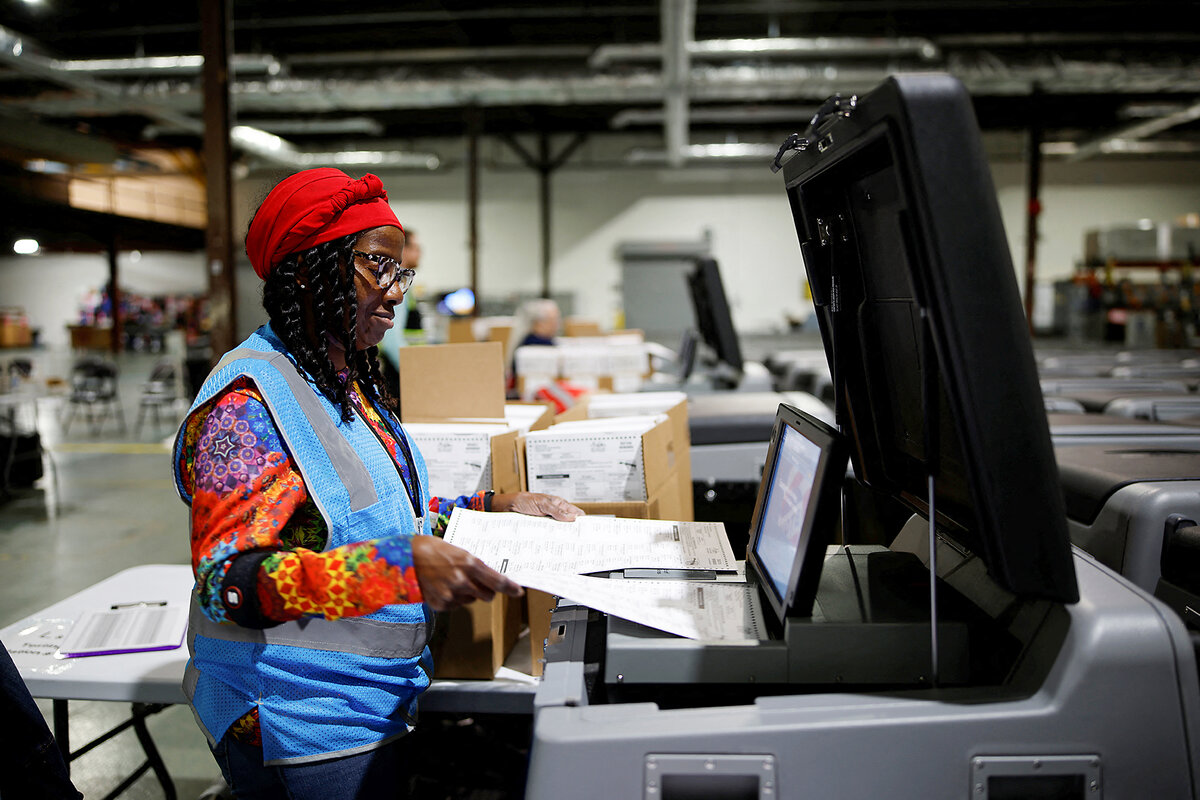
He cites, for example, a GOP-led U.S. House Oversight investigation into a California race 20 years ago that flagged 624 voters as noncitizens based on an Immigration and Naturalization Service database. However, in the report, the Democratic minority wrote that the results were flawed, citing letters from INS warning that the committee’s method of searching the database could result in false matches and flagging of citizens that had since been naturalized.
Ultimately, the California secretary of state did not prosecute any of the cases, determining that each registered in error, not with intent to register illegally.
But efforts by a handful of GOP secretaries of state have not turned up evidence of widespread noncitizen voting. They have flagged thousands of potential noncitizens who tried – and in some cases, succeeded – to register as voters, though only a fraction actually voted. The states, in announcing their findings below, did not disclose how they verified lack of citizenship. One option is cross-checking registered voters with the U.S. Citizenship and Immigration Services’ Systematic Alien Verification for Entitlements (SAVE) database, which verifies immigration status.
- Alabama: The state since 2023 has identified 3,251 noncitizens registered to vote, though it said it’s possible that some are now naturalized and eligible to vote.
- Georgia: A 2022 review in the state, which has a process for checking citizenship, found that election officials had flagged and prevented about 1,600 registration applications by potential noncitizens over the past 25 years.
- Ohio: This year, Ohio identified 138 noncitizens “who appear to have cast a ballot” by cross-referencing state and federal databases, including jury pool data.
- Virginia: Gov. Glenn Youngkin removed 6,303 noncitizens from the state’s voter rolls over the past two years, based on data collected by the Department of Motor Vehicles and shared with the state Department of Elections.
In each of these states, votes cast by noncitizens account for a significantly smaller share of overall fraud than other categories, such as deceased voters, voters who have moved out of state, or voters who still have a driver’s license from another state. In Texas, for example, of more than 1 million people removed from voter rolls since 2021, only 6,500 were potential noncitizens, and of those only 1,900 had voted.
Many opponents of stricter proof-of-citizenship standards say noncitizens already have a huge disincentive to vote, risking their status in the country or their ability to naturalize. However, some instances are unintentional, and often the penalties are minimal. For example, in the nearly four dozen cases Heritage documented, only one noncitizen was referred to Immigration and Customs Enforcement for deportation. Many did not serve any jail time, and apart from two men who faced a raft of other charges, the highest fine any paid was $2,500.
What are the counter-concerns about voting rights?
Some Democrats have warned that measures like additional updates for voter rolls or requirements for proof of citizenship could result in voter suppression. Proof-of-citizenship requirements act as an unnecessary hurdle for eligible voters, they say, often pointing to surveys that show that about 1 in 10 Americans don’t have ready access to documents like birth certificates and passports. The Biden administration echoed those concerns in a July statement, adding that an additional risk is accidentally purging eligible voters from voter rolls.
Critics of proof-of-citizenship requirements point to Kansas and Arizona as case studies showing that the number of eligible voters removed from the rolls can far exceed the number of ineligible voters identified.
In Kansas in 2020, a federal appeals court overruled the state’s 2011 law requiring documentary proof of citizenship to apply to register to vote. The court’s decision cited 31,089 voters whose applications were canceled or suspended in the state, and only found evidence that 67 noncitizens attempted to register and that 39 succeeded between 1999 and 2013, when the law took effect.
Editor’s note: This story, originally published on Sept. 10, was updated to note concerns that a U.S. House Oversight investigation used flawed methodology to determine how many noncitizens had voted in a California congressional race, and to correct the spelling of Mr. Reichlin-Melnick’s name.

To reach Kashmir’s nomads, classrooms move to the pasture
Access to education looks different depending on the community. In the hilly pastures of Kashmir, mobile schools meet little shepherds where they are.

- Quick Read
- Deep Read ( 4 Min. )
-
By Adil Amin Akhoon Contributor
Across India, tribal communities have long struggled to boost literacy and interest in education. Common challenges include seasonal migration, teacher absenteeism, and a lack of motivation on the part of parents.
The Gujjars and Bakarwals – pastoral nomads who live throughout Jammu and Kashmir – are no exception. Indeed, in these remote communities, literacy rates have historically lingered around 30%.
But a growing number of mobile schools for shepherds are working to change that.
Backed by regional education authorities, the schools have a curriculum that focuses on traditional academic subjects as well as life skills, environmental awareness, and cultural preservation. The teachers who run these open-air classrooms also serve as role models for the children. Many come from nomadic communities themselves and understand the unique challenges faced by the region’s little shepherds.
Mashkoor Ahmed Koka sees his students go the extra mile to balance their desire for education with the responsibilities related to grazing livestock and household chores. If kids occasionally run late to class, he doesn’t mind.
“They are our children, and we want to make a difference in their lives,” he says. “Just remember: If one of them gets educated, it will have an impact on the whole community.”
To reach Kashmir’s nomads, classrooms move to the pasture
It takes Mubarak Hussain Bajard two hours of trekking through dense forests to reach his classroom, careful to avoid the wild animals that live in the mountains of Dardpora, India.
When he arrives, a group of 16 children is waiting in the tree shade – all are members of Kashmir’s remote, pastoral communities, where literacy rates have historically lingered around 30%. As his whiteboard goes up, 16 books open, and the courtyard reverberates with recitations.
This is one of a growing number of mobile schools for shepherds.
Backed by regional education authorities, the schools have a curriculum that focuses on traditional academic subjects as well as life skills, environmental awareness, and cultural preservation. The teachers who run these open-air classrooms also serve as mentors and role models for the children. Many come from nomadic communities themselves and understand the unique challenges faced by the region’s shepherds.
“They are our children, and we want to make a difference in their lives,” says Mashkoor Ahmed Koka, another teacher. “Just remember: If one of them gets educated, it will have an impact on the whole community.”
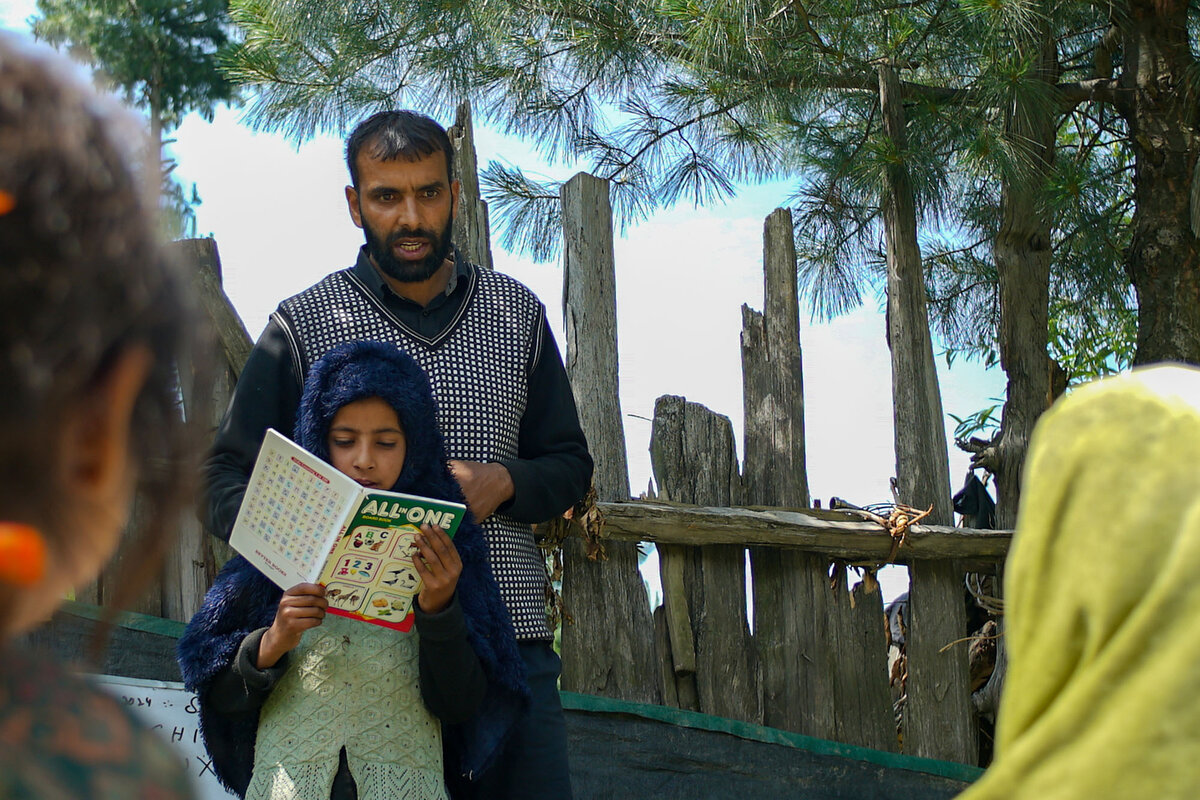
Teachers bring passion to the pastures
Across India, tribal communities have long struggled to boost literacy rates and overall interest in education. Common challenges include seasonal migration, teacher absenteeism, and lack of motivation on the part of parents.
The Gujjars and Bakarwals – pastoral nomads who live throughout Jammu and Kashmir – are no exception.
This is why, high in the mountains surrounding the Kashmiri village of Dardpora, the local education department has set up around 25 mobile schools, providing a ray of hope for children who would otherwise have limited or no access to education. Head Clerk Nasir ul Islam says education officers select teachers – who make a salary of $120 per month and receive tents and other supplies from the government – and carry out surprise visits to the schools throughout the school season, which starts as early as April and runs to September or October, depending on weather. And officials say demand for mobile schools is growing.
This year, more than 1,000 schools served tens of thousands of children throughout Kashmir.
Nizamuddin Gojjar Khatana has three children participating in the program – the only members of the family enrolled for formal education. “I have ruined my life by ignoring the importance of education, but I won’t let it happen to my children,” he says.

Mr. Khatana praises their passionate teacher, Shaista Akhtar. Born and raised in a nomadic family, she witnessed firsthand the struggles faced by her students, and received her primary education at a similar school for little shepherds. Determined to make a difference, Ms. Akhtar continued her studies at a local high school, and started teaching five years ago, at age 19.
“There are only two to three female teachers” in the Dardpora area, she says. “And it is not easy to break the shackles of ignorance. I have to convince and motivate the children.”
Her hard work has not gone unnoticed. “Apart from teaching, she inspires our children to take education seriously,” says Mr. Khatana, adding that his children can already read and write, unlike him.
Juggling chores, cattle, and homework
Yet nomadic students must also balance their desire for education with the responsibilities related to grazing livestock.
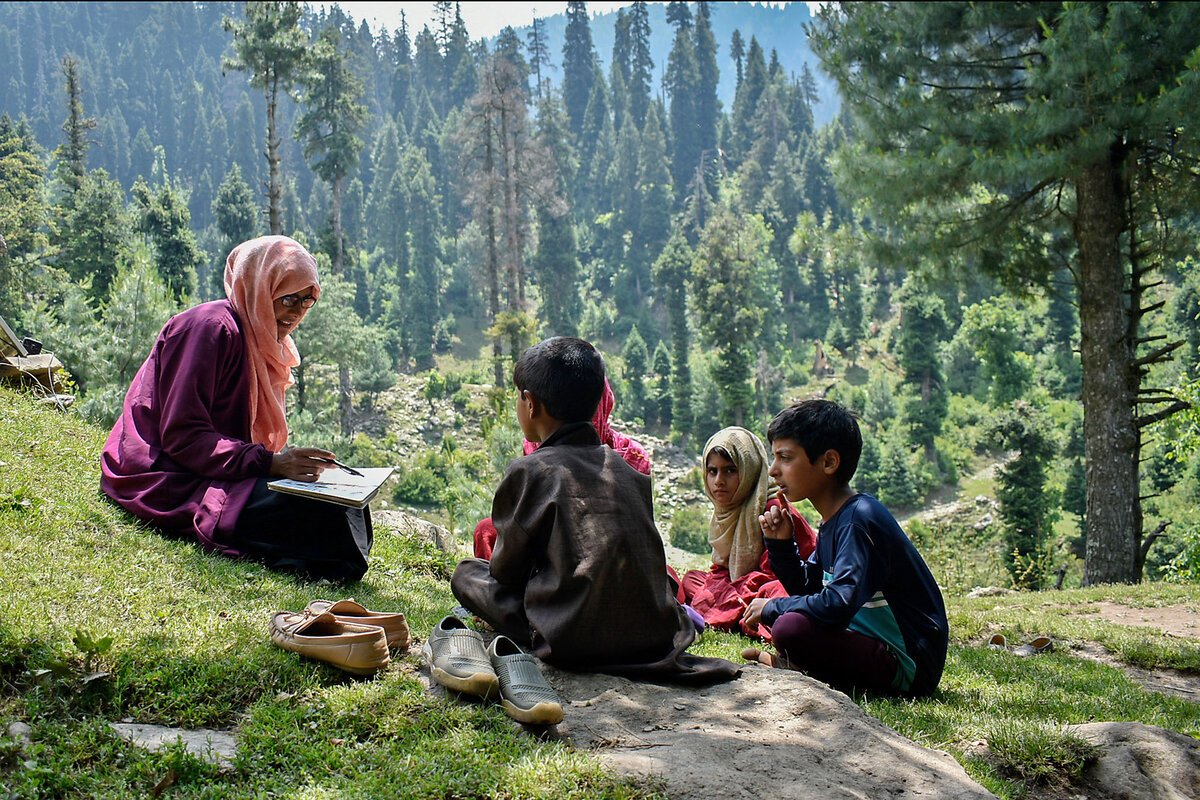
Children from pastoral communities are expected to participate in crucial grazing activities from a young age. Boys are primarily responsible for herding cattle, while girls are expected to take care of household chores and help with the animals when needed.
To get their education, teenage cousins Khalida Akhtar (no relation to Ms. Akhtar) and Jeelani Ahmed go the extra mile. They leave early in the morning to take cattle to the grazing fields, and even still, they often run late for class.
“It takes us a couple of hours to look for greener pastures,” says Jeelani. “We want to get education like other kids get, but we have the responsibility of grazing cattle on which our livelihoods depend. That’s why we juggle.”
Their tardiness doesn’t anger their teacher. “The grazing of cattle is passed down from one generation to another. We have to be supportive,” says Mr. Koka. “If they are careless in taking care of cattle, they get scolded by their parents.”
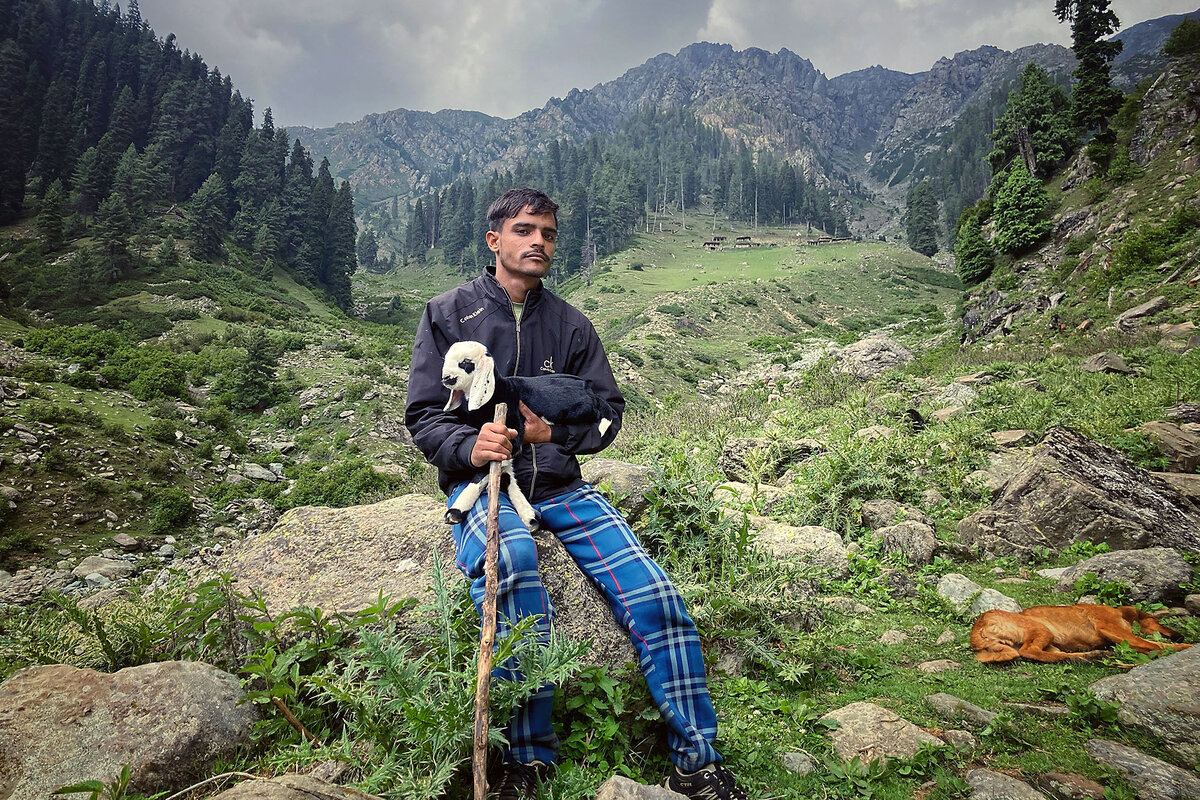
After school, the duo immediately scurry back toward the grazing field.
Khalida, an extroverted teen with dreams of becoming a doctor, does her homework late at night, after class is done, the cattle is home, and the household chores are complete. Her schedule is tiring, and unpredictable, but she’s grateful for the chance to learn.
“If there were not these schools around our bahaks [temporary settlements], we would not be able to get an education,” she says.
It’s a hopeful sentiment echoed by their teachers.
“Their fathers and forefathers remained uneducated. If there were no nomadic schools around, the fate of children would remain the same,” says Mr. Bajard. “It is because of these schools, that there are nomadic people into the different professions. Education, of course, can open any door.”

As US marks 9/11, a divided Congress unites to honor 13 fallen in Afghanistan
In our congressional correspondent’s four years of reporting on Capitol Hill, it’s been rare for her to see lawmakers resist opportunities for political digs. But on Tuesday in the Capitol Rotunda, they put bipartisan sparring aside to honor fallen service members.

- Quick Read
- Deep Read ( 4 Min. )
On the eve of the anniversary of 9/11, Democratic and Republican leaders joined to award the Congressional Gold Medal to 13 U.S. service members killed by a suicide bomber during America’s chaotic 2021 withdrawal from Afghanistan.
In a poignant ceremony full of pageantry at the Capitol Rotunda in Washington, family members of the 13 dabbed their eyes; others sat erect and resolute. A baby gurgled, a photographer dropped her lens cap, and strains of the U.S. Army Brass Quintet echoed off the murals depicting seminal moments in American history.
The Republican-led House Foreign Affairs Committee had released a report Monday excoriating the Biden-Harris administration for the withdrawal, saying it undermined America’s credibility. The report did not focus on the role of former President Donald Trump, who had agreed to withdrawal terms before Joe Biden took office.
Despite that backdrop and a consequential election season, the ceremony was notably nonpolitical. Democratic and Republican lawmakers, standing side by side, focused on honoring those who, they repeated, “made the ultimate sacrifice” in the name of freedom and democracy.
As US marks 9/11, a divided Congress unites to honor 13 fallen in Afghanistan
It takes a lot to bring Democrats and Republicans together these days. But 13 fallen heroes did it on the eve of the anniversary of 9/11.
The occasion was the awarding of the Congressional Gold Medal – the highest award Congress gives – to 13 service members killed by a suicide bomber in the final days of the chaotic U.S. withdrawal from Afghanistan three years ago.
Under the Capitol dome, family members of the 13 dabbed their eyes; others sat erect and resolute. A baby gurgled, a photographer dropped her lens cap, and the strains of the U.S. Army Brass Quintet echoed off the murals depicting seminal moments in American history.
The lawmakers demonstrated restraint, if not comity. They sat next to each other. They stood next to each other. They largely blamed terrorists instead of each other, though House Speaker Mike Johnson made an early, direct dig at the Biden-Harris administration.
Even if it was a brief, imperfect reprieve among members of Congress, it was a refreshing one.
The ceremony – attended by several top military and White House officials – took place against a backdrop of political fighting over who is to blame for the botched U.S. withdrawal from Afghanistan. The Republican-led House Foreign Affairs Committee released a report this week excoriating the Biden-Harris administration for its lack of planning, transparency, and accountability, saying it undermined America’s standing in the world among both allies and adversaries. The report did not focus on the role of former President Donald Trump, who had agreed to withdrawal terms before President Joe Biden took office.

Despite that backdrop – a nation struggling with sharp political polarization and a consequential upcoming election – the ceremony itself was notably nonpolitical. Lawmakers exercised a discipline rare these days and focused on honoring those who, they said, “made the ultimate sacrifice” in the name of U.S. ideals of freedom and democracy. They called on their fellow Americans to live lives worthy of that sacrifice.
“Scripture teaches us that ‘Greater love hath no man than this, that a man lay down his life for his friends,’” said Mr. Johnson, a Louisiana Republican. “Today we honor that very love” – love embodied, he added, by 13 men and women of valor.
“Their names are etched in our hearts and now into the history of our nation,” he said. “And they are:
“Marine Corps Staff Sgt. [Darin] Taylor Hoover.
“Marine Corps Sgt. Johanny Pichardo.
“Marine Corps Sgt. Nicole Gee.
“Marine Corps Cpl. Hunter Lopez.
“Marine Corps Cpl. Daegan Paige.
“Marine Corps Cpl. Humberto Sanchez.
“Marine Corps Lance Cpl. David Espinoza.
“Marine Corps Lance Cpl. Jared Schmitz.
“Marine Corps Lance Cpl. Rylee McCollum.
“Marine Corps Lance Cpl. Dylan Merola.
“Marine Corps Lance Cpl. Kareem Nikoui.
“Navy Petty Officer 3rd Class Maxton Soviak.
“Army Staff Sgt. Ryan Knauss.”
They were peacemakers, added Mr. Johnson’s Democratic counterpart, House Minority Leader Hakeem Jeffries. “Blessed are the peacemakers,” he said.
Pageantry accentuated the solemn tone: the color guard, a brass quintet, the chaplains’ prayers, and a resonant bass singing “The Star-Spangled Banner” ricocheting around the Rotunda.
The costumes and props were of the 21st century. But it was, in fact, an age-old scene. People willing to fight for something larger than themselves. And when they fall, being lauded as inspirations rather than as failures.
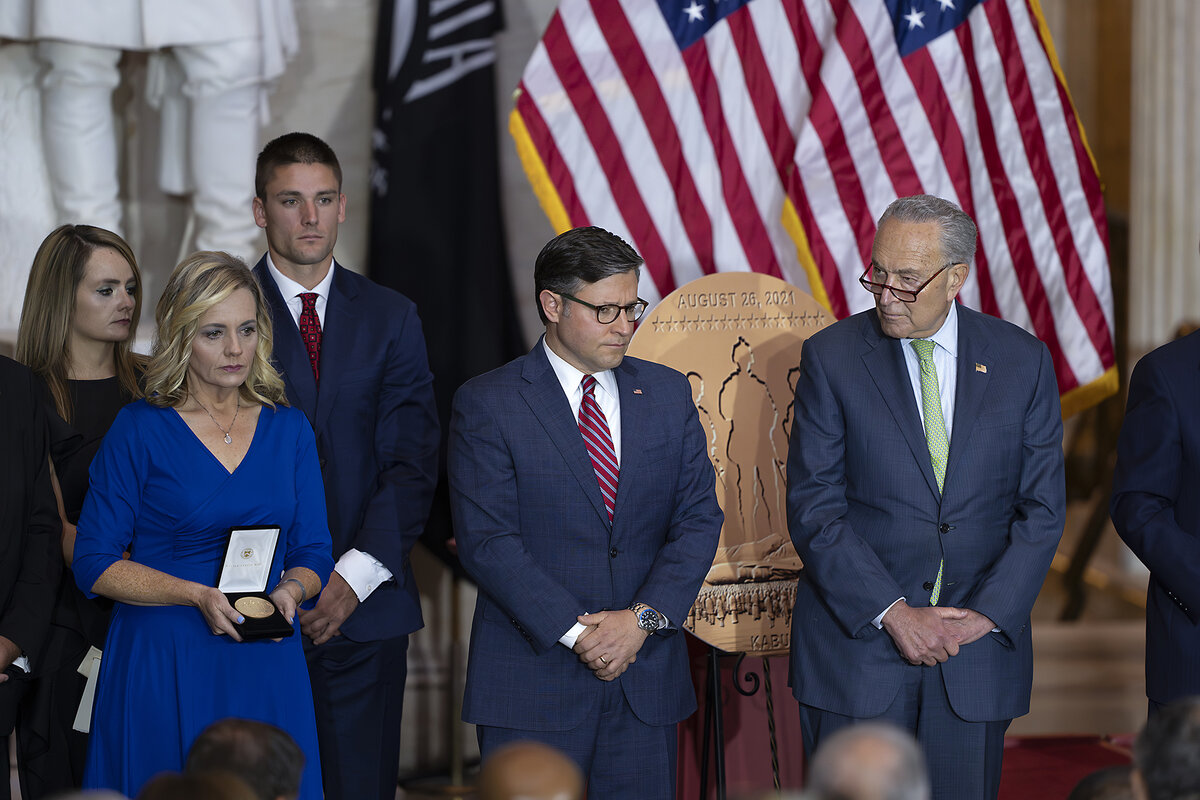
Senate Minority Leader Mitch McConnell, a Republican who has served nearly 40 years as a Kentucky senator, highlighted something special about each of the 13. A contagious laugh. A thirst for life. A baby on the way.
Then Senate Majority Leader Chuck Schumer of New York, one of the two highest-ranking Democrats to meet with the families since the service members’ deaths in 2021, took the podium.
“It now falls on us, to all of us gathered here under the dome of Lady Liberty, to ensure the sacrifices of all our service members were not in vain,” he said.
“We must care for them and their families,” he continued, “and defend the values of freedom and democracy they so nobly fought for.”
Toward the end, Corporal Sanchez’s mother, Coral Doolittle, spoke almost inaudibly at first, and then bolder and louder. “Their love for this country was greater than the threat they faced from this enemy,” she intoned.
“Continue to sustain and comfort the families who have made incalculable sacrifices for freedom,” said Senate Chaplain Barry Black, calling their sons and daughters heroes and heroines. “Help us, mighty God, to go beyond words and medals – to live lives that truly honor David, Nicole, Darin, Ryan, Hunter, Rylee, Dylan, Kareem, Johanny, Humberto, Jared, Maxton, and Daegan.”

These Black artists create a new relationship with the sea
The relationship between Black people and the Atlantic Ocean is often a heavy, tragic one. But artists in “Becoming the Sea” use the exhibit as an opportunity to reclaim and transform the water narrative.

- Quick Read
- Deep Read ( 5 Min. )
At first glance, a painting in the new exhibit “Becoming the Sea” might seem off-topic.
In it, a Black father is caring for his children. Curator Dexter Wimberly sees a direct correlation between “Not Without Laughter,” by Tajh Rust, and the show’s theme.
“It’s rare to see portraits of Black fathers with their children,” he says. “Water connects all of us in a variety of ways. It’s also a sustaining body – a thing that keeps us alive. Parents keep their children alive.”
The pieces in the exhibit – which include paintings, writing, and video – are generated by Black Rock Senegal, an international artist-in-residence program. The work the 12 artists have produced, on display at the Harvey B. Gantt Center for African-American Arts + Culture in Charlotte, North Carolina, toggles between present and future, the everyday and the fantastical. It conveys stories in text, hues, and emotion.
“It spoke to our existence, not just in skin tone, but just the blues that are continually playing in our livelihood,” says Shawn Allison, a Charlotte-based blogger. “But at the end of the day, there’s still that joy that we have as Black people ... and no one can take it away.”
These Black artists create a new relationship with the sea

Heartbreak and tragedy often accompany interpretations of Black people and the Atlantic Ocean. Stories of the transatlantic slave trade, or the “Door of No Return” in Ghana that Africans were forced through, are heavy. How could they not be?
And yet, the power of water and sounds of the sea can also provide a sense of solace and triumph. That vision is featured in “Becoming the Sea,” a new exhibit at the Harvey B. Gantt Center for African-American Arts + Culture in Charlotte, North Carolina. The works on display – which include paintings, photography, writing, and video – are generated by Black Rock Senegal. The international artist-in-residence program was founded by Kehinde Wiley, known for his portrait of former President Barack Obama, in 2019.
What the 12 artists have produced toggles between present and future, the everyday and the fantastical.
“I really saw a lot of deep hues with the colors that were being used. It spoke to our existence, not just in skin tone, but just the blues that are continually playing in our livelihood,” says Shawn Allison, a Charlotte-based blogger and culture critic, in a phone interview. “But at the end of the day, there’s still that joy that we have as Black people … and no one can take it away.”
A palpable sense of joy – and sustenance
That palpable sense of joy and responsibility bursts out of one particular painting. In it, a Black father is caring for his children. That might not be an image associated with aquatic themes, but curator Dexter Wimberly sees a direct correlation between “Not Without Laughter,” by Tajh Rust, and a glorious purpose.
“[It] resonated with me because it’s rare to see portraits of Black fathers with their children. It was imperative for me to put that in the show,” Mr. Wimberly said in an interview with the Monitor during an opening celebration for the exhibit on Aug. 9. “It connects to the title in the sense that water connects all of us in a variety of ways. It’s also a sustaining body – a thing that keeps us alive. Parents keep their children alive.”

Despite the prominence of a burp cloth on the father’s left shoulder, there is a regality to Mr. Rust’s piece. The patriarch is a towering figure with dark skin, cradling his young daughter and infant son. The couch they are sitting on has an African motif, and a nearby table holds pieces that are influential to Mr. Rust. One of those is “Homegoing” by Yaa Gyasi, a book of interlinked tales that tell the very real stories of the slave trade and effects of trauma over decades.
As Mr. Rust, the artist, sees it, water offers a universality and presence – a place to begin when telling a story.
“I think water is one thing we can all look to, to talk about a common ancestry, a shared mobility. But water, the ocean I should say, it’s fun to paint, on an aesthetic level. It holds a lot of meaning, and it’s fluid,” he says in a video conversation with Mr. Wimberly released by the Gantt Center.
Painting women as “supernatural beings”
In “Becoming the Sea,” artists push and pull on the past and the future. The exhibit taps into the genre of Afrofuturism, a movement that melds science fiction with Black history and culture. The concept has been around for generations, but the ideology received a boost from Marvel’s 2018 blockbuster “Black Panther,” which envisioned the technologically advanced African nation of Wakanda.
Grace Lynne Haynes, whose work has been featured in The New Yorker and on PBS, found inspiration in a quote from jazz musician Sun Ra. In the song “Somebody Else’s World,” he writes: “Somebody else’s idea of somebody else’s world is not my idea of things as they are. Somebody else’s idea of things to come need not be the only way to vision the future.”
Ms. Haynes took that freedom to heart – and to her art. What resulted are a pair of water-themed pieces with sea-based imagery. What really makes the canvas come alive is her interpretation of Black women. They aren’t earthly beings, with traditional limbs. They are otherworldly, and even within the paintings, far removed from what we would consider everyday life.
“The women that I paint are supernatural beings. They don’t hold the pain and traumas of the world that we’re in. They are associated more with their ecologies and their environments,” Ms. Haynes said in an opening night conversation with Mr. Wimberly, the curator. “And so as they move their hands together, they’re able to intermingle with nature, with the fish, the ocean. In this world, I’m thinking about how we intermingle with different species and also learning to decenter humans. … I’m thinking about how I can incorporate more of our planet, the world, and other species into the work.”
Culturalist Ytasha Womack is a leading voice on the concept of Afrofuturism. She also is among the artists featured in the exhibit. Ms. Womack created a zine called “Fluid,” which she has said deals with water mythos.
“The value of Afrofuturism is that it reminds you that African diaspora cultures, like all cultures, have a space-time relationship,” the author says in an interview with the Monitor. “It’s evident in language, in storytelling, how people gather. It’s in the art, it’s in the music.”

How does a Black future correlate with “Becoming the Sea,” then? It’s simple. Water isn’t just life. It can also symbolize the afterlife – an understanding and appreciation of history in a way that uplifts and liberates.
“When you think about African diasporic relationships to spirituality, water comes up a lot. If you’re Christian, it’s baptisms. In the Congolese cosmogram, there’s a river that separates the seen and unseen worlds,” Ms. Womack says. “Of course, water is central to life. ... But water, in a lot of Western ideas, symbolizes the subconscious. So it’s this idea of pulling from the subconscious and creating something new, which lends itself to a lot of great art and conversation.”
Other headline stories we’re watching
(Get live updates throughout the day.)The Monitor's View
Honesty as income in Argentina
- Quick Read
- Deep Read ( 2 Min. )
-
By the Monitor's Editorial Board
In Argentina, it is called the “national sport.” It is the game of tax dodging in which individuals and companies play cat and mouse with tax collectors. In July, the government decided to change the rules. It announced an amnesty for citizens who declare unreported wealth up to $100,000. Since that offer of forgiveness, banks have opened more than 100,000 new accounts tied to the amnesty. Total deposits now exceed $1.4 billion in previously undisclosed assets.
The tax pardon is only part of an attempt by a government that swept into power less than a year ago to uproot corruption at many levels of society. Yet the amnesty could have one immediate effect. If honesty becomes a norm and more people come clean, it brings cash quickly into the economy.
Argentina has made a start in promoting honesty by inviting tax cheaters to admit their wrongdoing, perhaps forcing a change of heart about their civic responsibility. The new rules may be giving Argentines confidence that it pays to play a sport different than one based on cheating. Honesty can breed more honesty.
Honesty as income in Argentina

In Argentina, it is called the “national sport.” It is the game of tax dodging in which individuals and companies play cat and mouse with tax collectors. In July, the government decided to change the rules. It announced an amnesty for citizens who declare unreported wealth up to $100,000. Since that offer of forgiveness, banks have opened more than 100,000 new accounts tied to the amnesty. Total deposits now exceed $1.4 billion in previously undisclosed assets.
The tax pardon is only part of an attempt by a government that swept into power less than a year ago to uproot corruption at many levels of society. Yet the amnesty could have one immediate effect. If honesty becomes a norm and more people come clean, it brings cash quickly into the economy. For Argentina, where an economic crisis has left more than half of people in poverty, that helps relieve high debt and boosts investments.
So far, however, only a fraction of an estimated $204 billion hidden away in untaxed wealth has been declared. Argentina has offered tax amnesties on average every four years over the past two decades. They didn’t often work because they were followed by disincentives such as higher taxes or deep bouts of corruption, particularly when government changed hands between political parties.
The new amnesty is seen as different. It excludes individuals who have held public office at any time during the past 10 years, along with members of their families. State contractors are also ineligible. The law bars assets from being registered in the name of third parties. It coincides with other reforms meant to bring more transparency to public contracts.
Creating momentum in paying taxes has an intangible benefit of strengthening trust in the rule of law. Scholars find that official honesty in government and a greater fairness in tax burdens encourage citizens to pay their share.
Argentina has made a start in promoting honesty by inviting tax cheaters to admit their wrongdoing, perhaps forcing a change of heart about their civic responsibility. The new rules may be giving Argentines confidence that it pays to play a sport different than one based on cheating. Honesty can breed more honesty.

A Christian Science Perspective
Each weekday, the Monitor includes one clearly labeled religious article offering spiritual insight on contemporary issues, including the news. The publication – in its various forms – is produced for anyone who cares about the progress of the human endeavor around the world and seeks news reported with compassion, intelligence, and an essentially constructive lens. For many, that caring has religious roots. For many, it does not. The Monitor has always embraced both audiences. The Monitor is owned by a church – The First Church of Christ, Scientist, in Boston – whose founder was concerned with both the state of the world and the quality of available news.
No soliciting!
- Quick Read
- Read or Listen ( 4 Min. )
-
By Mayal Tshiabuila
As the children of God, we have the authority to dismiss thoughts that don’t align with God’s wholly good nature and claim the blessings of thoughts that do.
No soliciting!
Characteristic of my city is a multiplicity of terraces – open places along streets or on street corners where guests may sit and enjoy a drink and a snack. No sooner are you seated than peddlers start streaming to you.
On my first visit to the United States, I noticed that a number of properties had a “No soliciting” sign in front. Oh, how I wished I could carry around with me in my own city a banner with that message!
Solicitors in our towns can be annoying but are relatively easy to dismiss. But what about the endless stream of mental solicitors that come to us – thoughts suggesting, for example, that we are discouraged or that something is impossible to resolve or heal? These tend to be harder to ignore or dismiss, since they frequently come disguised as our own thoughts and peddle messages that sound credible or alluring, such as “This situation is hopeless”; “If you cheat only this one time, the world won’t collapse”; “If you don’t take advantage of this opportunity, you’ll end up poor all your life.”
However believable they might seem to us, these unwelcome solicitors are peddling nothing but untruths – thoughts that have no basis in God, the one divine Mind and source of all true intelligence. We can easily identify them because they are devoid of hope and spiritual inspiration.
How can we repel these intruders and see that they don’t return? Mary Baker Eddy, the discoverer of Christian Science, was quite aware of these spoilers of health and happiness. Speaking from experience, she provides the student of this Science with plenty of instructions about how to handle them. For instance, on page 392 of “Science and Health with Key to the Scriptures,” she writes, “Stand porter at the door of thought. Admitting only such conclusions as you wish realized in bodily results, you will control yourself harmoniously.”
If we want to experience health, then we must not accept the belief that we can have a disease. If we want to feel at peace, we must not accept that discord has any reality. This is not to say that we ignore evil, but rather that we see what the solicitation is trying to accomplish and understand that it cannot do so because it has no reality, no truth. This is the watching that Christ Jesus was referring to when he said, “Take ye heed, watch and pray” (Mark 13:33).
Jesus came into the world to show humanity the unreality of evil, and he demonstrated through his healing works that God is supreme, ever present, the only reality and power. When we understand the powerlessness of evil and the allness of God, good, we are less likely to succumb to negative suggestions.
I was reminded of this need when I found myself attracted by news articles criticizing our country’s government. For a good while, I was disturbed by such news. I asked myself if it were possible to pray effectively while at the same time accepting evidence of evildoing and criticizing those in power. The answer was obvious: No! From then on, I started to watch my thoughts, and I made efforts to appreciate the good that I could see.
The more I did that, the more I felt at peace.
Such prayer does not just provide us with peace of mind; it heals the discords of human existence. Here is a small example.
More than once, I have found myself in one of my city’s massive traffic jams. Instead of going along with harsh criticisms voiced around me, I affirm to myself that God, good, is the real power, and that God, Mind, is all intelligence and is reflected by all His children, as Christian Science teaches. The circumstances always change for the better. Prayer for the common good and our world can make a difference.
It also has a salutary effect in our personal affairs, as I experienced several years ago.
While working for a United Nations agency in my country, I was suddenly struck with a persistent cough. I was used to relying on prayer for healing, and I started to pray for myself. Those I shared an office with were quite concerned. But I knew the truth of the matter – that I am a spiritual idea, the reflection of God, and, as such, always in perfect health – so I did not waver. I asked a friend to support me in that prayerful work, and the coughing was soon over. This healing took place over 10 years ago.
I must confess that the battle is not yet won against the unwelcome solicitors that regularly come to thought claiming reality, but victory is certain when we watch and pray. I remain in a watching mode, with my “No soliciting” banner posted in thought. And I invite you to join me!
Pour lire cet article en français, cliquez ici.
Adapted from an article published in the Nov. 21, 2022, issue of the Christian Science Sentinel.

Viewfinder
A contemplative moment

A look ahead
Thank you for joining us today. As a parting gift, we offer a wonderful essay in farewell to summer, with wistful memories of campfires, beaches, and blueberry pies. You can read it here.


